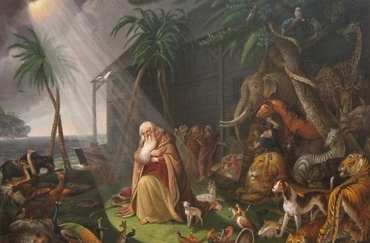Arcana Coelestia #893
893. Verse 13 And it happened in the six hundred and first year, at the beginning, on the first of the month, that the waters dried up from over the earth, and Noah removed the covering of the ark, and saw out, and behold, the face 1 of the ground was dry.
'It happened in the six hundred and first year' means a finishing point. 'At the beginning, on the first of the month' means a starting point. 'The waters dried up from over the earth' means that falsities were not at that time apparent. 'And Noah removed the covering of the ark, and saw out' means the light, once falsities had been removed, shed by the truths of faith, which he acknowledged and in which he had faith. 'And behold, the face 1 of the ground was dry' means regeneration.
Footnotes:
1. literally, the faces
[893a] 1
That 'it happened in the six hundred and first year means a finishing point is clear from the meaning of the number six hundred, dealt with at Chapter 7:6, in 737, as a beginning, and in particular in that verse as the beginning of temptation. The end of it is specified by the same number, with a whole year having now passed by. It took place therefore at the end of a year, and this also is why the words are added 'at the beginning, on the first of the month', meaning a starting point. In the Word any complete period is specified either by a day, or a week, or a month, or a year, and even by a hundred or a thousand years - for example, 'the days' mentioned in Genesis 1, which meant stages in the regeneration of the member of the Most Ancient Church. For in the internal sense day and year mean nothing else than a period of time; and meaning a period of time they also mean a state. Consequently a year stands in the Word for a period of time and for a state, as in Isaiah,
To proclaim the year of Jehovah's good pleasure, and the day of vengeance for our God; to comfort all who mourn. Isaiah 61:2.
This refers to the Lord's Coming. In the same prophet,
The day of vengeance was in My heart, and the year of My redeemed had come. Isaiah 63:4.
Here too 'day' and 'year' stand for a period of time and for a state. In Habakkuk,
Your work, O Jehovah, in the midst of the years make it live, in the midst of the years do You make it known. Habakkuk 3:2.
Here 'years' stands for a period of time and for a state. In David,
'You are God Himself, and Your years have no end. Psalms 102:27.
This statement, in which 'years' stands for periods of time, means that time does not exist with God. The same applies in the present verse where 'the year' of the flood in no way means any one particular year but a period of time that is not determined by a specific number of years. At the same time it means a state. See what has been said already about 'years' in 482, 487, 488, 493.
1. This paragraph is not numbered in the Latin.
Beast

In Genesis 1:24, beasts signify the things of man's will or loves. (Arcana Coelestia 44, 46)
In Genesis 9:10, beasts signify all that was living in the man of the Ancient Church, and also what belonged to his new will; likewise the lower things of his understanding and the will therefrom. (Arcana Coelestia 1026-1029)
In Psalm 104:20, beasts signify affections longing to be instructed, or spiritually nourished. (Apocalypse Explained 650[10])
In Luke 10:35, since the beast was a donkey, this signifies to instruct another according to his capability. (Apocalypse Explained 1154)
The beast of the south (Isaiah 30:6) signifies people who are principled in the knowledges of good and of truth, but do not apply them to life and instead to science.
Every beast and creeping thing (Genesis 8:19) signifies the goodnesses of the internal and external man.
"Beasts" represent the affection for doing good things, a true desire to do them from the heart. In the negative sense, "beasts" stand for the lust to do evil.
The beast ascending out of the sea (Revelation 13:1) signifies reasonings from the natural man confirming the separation of faith from life.
(References: Apocalypse Explained 13, 773; Revelation 13:11)






